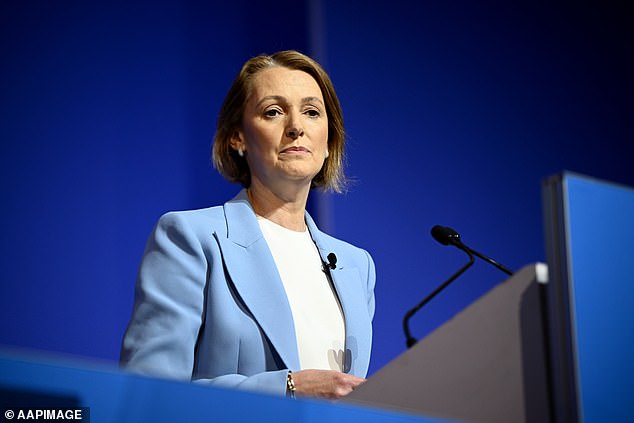Telstra staff have been told they will be expected to use artificial intelligence every day in their jobs, while continuing to enjoy the option of working remotely from anywhere.
‘Flexible working is absolutely a core part of how we operate,’ chief executive Vicki Brady said on Thursday, describing the company’s push to embed AI into all roles as part of a broader strategy to ‘radically innovate’ its operations.
For employees, that means finding ways AI can boost productivity, regardless of whether they work from home or in the office.
Ms Brady has been a vocal supporter of hybrid work, breaking ranks with other business leaders calling for a full return to the office.
‘We’ve got to really radically innovate in the core of our business. And hybrid working, I would say, for me, it’s one of those things,’ she said.
‘That looks different for different teams across our business, but absolutely some time together, face-to-face, is part of that in bringing the best out of teams.’
Like Commonwealth Bank boss Matt Comyn, Ms Brady is an active user of AI and expects her staff to follow suit.
Telstra has become Microsoft’s largest Australian customer for its Copilot AI assistant, securing 21,000 licences, and has launched a data and AI academy to train employees.

Telstra CEO Vicki Brady (pictured) said that staff would be expected to use AI every day (stock)
‘That’s a big investment, but that’s an investment in our teams to really gain that experience in how to apply AI in every job across our business. And when I say every job, I mean every job,’ she said.
‘That’s the expectation that all of us need to be adopting AI in how we operate.’
She said practical use was key to unlocking AI’s benefits.
‘One of our early lessons here was you can learn the theory of it, but you’ve got to have that practical, hands-on ability to try it, to use it, to figure out how it can deliver benefits for you,’ she said.
Ms Brady pointed to one team that used Copilot to transform a lengthy market analyst report into a 30-minute podcast, making the information far easier to digest.
‘Some of those tips and tricks are definitely the things that we’re finding is working. And we’re absolutely finding our teams really curious and eager to learn.’
Her comments came as Telstra posted its slowest mobile growth in four years following the shutdown of its 3G network.
Annual net profit surged 31 per cent to $2.34bn, driven largely by aggressive cost-cutting, including 550 job cuts announced in July on top of nearly 1900 roles shed earlier in 2024.

Telstra is Australia’s largest customer of Microsoft Co-Pilot, with 21,000 licences (stock)

Telstra staff will also be allowed more flexibility to work remotely
Revenue was flat at $23.9bn.
Despite the soft mobile performance, Telstra will return $1bn to investors through a share buyback and lift its full-year dividend 5.6 per cent to 19 cents.
It follows a $750m buyback just two months earlier.
‘We are focused on continuing to deliver value for our shareholders … carefully consider[ing] the balance between investing in the growth of our business and the potential for additional shareholder returns,’ Ms Brady said.
The announcement comes as the Victorian Government proposes mandating two days a week working from home for eligible staff, a move opposed by major business groups, which say such rules interfere with employer-employee agreements.







